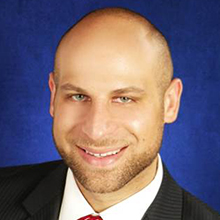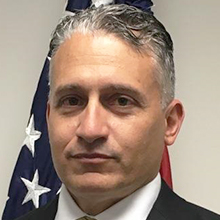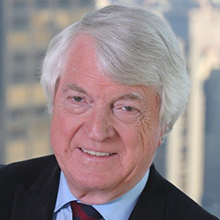
ACAMS Today caught up with Peter Wild, CAMS-Audit, an independent consultant in the anti-money laundering/counter-terrorist financing (AML/CTF) and sanctions field; Anthony Dominicis, an assistant Special Agent in Charge of the Miami Field Office; and Jason Chorlins, CAMS, a principal in the Risk Advisory Services practice for Kaufman Rossin to discuss forensic accounting and their pre-conference workshop on June 8 at the ACAMS 5th Annual AML Risk Management Conference in New York.
ACAMS Today: Why is forensic accounting essential to criminal investigations?
Peter Wild: It is essential because the purpose is to collect and assemble the financial evidence to support the conviction of the perpetrators.
Anthony Dominicis: Crimes are committed because of passion or greed. Crimes for monetary gain need some element of forensic accounting and the Internal Revenue Service, Criminal Investigation (IRS-CI) Special Agents are the best financial investigators in the world. We work with federal, state, and local law enforcement agencies on a variety of cases and are often asked to use our financial expertise to unravel schemes and conduct forensic accounting in complex investigations. Following the money leads to the principals involved, identifies unknown co-conspirators, provides evidence for the elements of the crime, and allows law enforcement to seize and forfeit the ill-gotten gains. In addition, financial charges may be the only viable option in some investigations. I completed several criminal investigations where the principals were removed from a drug conspiracy or criminal act but were prosecuted for tax and other financial crimes based on the circumstantial evidence.
Jason Chorlins: Forensic accountants assist in investigations by documenting the persons and methods utilized to commit a financial crime. These financial investigations may lead to potential convictions and potentially to recovering all funds obtained through the financial crime. In addition, understanding how financial crimes are committed is essential in preventing futures crimes from occurring.
AT: How does forensic accounting enrich an anti-money laundering (AML) program?
PW: The regular investigation of AML/CTF alerts is only concerned with reporting details of transactions which are considered to be potentially suspicious. Forensic accounting is not a substitute for that work, because it is a much more comprehensive investigation which tracks the transactions across all the related financial institutions in order to prove guilt. Also it will typically take much longer than the SAR filing timeframe.
JC: Forensic accounting techniques can assist AML investigators in researching potentially suspicious activity and providing more useful information in a SAR filing. The information provided in a SAR can assist law enforcement in developing leads to a potential criminal investigation. As such, the depth of an AML investigation utilizing forensic accounting techniques will help enrich the SAR reporting process and the institution’s compliance with reporting requirements.
AT: How does forensic accounting differ from typical know-your-customer and due diligence procedures?
JC: The purpose of customer due diligence is to enable the financial institution to predict with relative certainty the types of transactions in which a customer is likely to engage. These processes assist the financial institution in determining when transactions are potentially suspicious. Forensic accounting is the art of solving complex financial crimes through the use of investigative accounting techniques. This differs from KYC/due diligence because in the case of forensic accounting, a financial crime has allegedly occurred.
AT: Can forensic accounting lead to a stronger risk management in a financial institution? If so, how?
AD: I think so. Financial institutions need to combat internal and external fraud. Forensic accountants may be able to uncover embezzlement, fraudulent loan schemes perpetrated via customers or employees, and possibly dubious capital investments. The presence of a strong forensic accounting department may also lead to increased accountability for business decisions throughout the institution.
JC: By understanding how financial crimes can occur, a financial institution can strengthen its AML compliance program and internal controls assisting with the mitigation of being utilized as a conduit for money laundering or financial crimes. This will help the financial institution understand its AML risk profile and allow the financial institution to set internal controls that are commensurate with its AML risk profile.
AT: How do you build a successful forensic accounting team?
JC: The key to a successful forensic accounting team begins with the leadership and a strong background in accounting, preferably a licensed Certified Public Accountant. The foundation of the team should be built on the experience and knowledge of understanding the complexity of forensic accounting investigations.
AT: How should financial institutions integrate their forensic accounting teams within their institution? What kinds of partnerships and information-sharing should forensic accounting teams conduct with other departments within the institution?
PW: I do not think that it is a requirement for every FI to have a forensic accounting team, but every FI does need proper documented procedures to ensure prompt and full cooperation when called upon to support an external investigation.
JC: As the convergence of fraud and AML continues to gain momentum, it is important to break down any barriers that may exist to allow for information sharing within the financial institution. In addition, the financial institution should understand and have procedures in place to know when to bring in external investigators to assist in potential financial investigations.
AT: Financial crimes cover many facets of criminal activity, where do you see forensic accounting making the biggest impact?
PW: Any case where the financial evidence is required to identify the guilty parties and convict them, e.g., in the Madoff case reviewing the actual transactions identified who had knowledge of the fraud.
AD: I see the biggest impact with international tax evasion and transnational organized crime. We are also an integral partner in combating the trafficking of narcotics and the financing of terrorism by investigating criminal violations of the Internal Revenue Code, Bank Secrecy Act and federal money laundering statutes. The proliferation of international entities used to layer and place monies makes it an ideal avenue to create complex and sophisticated schemes. The ability of IRS-CI Special Agents to unravel the tangled web is critical to identifying the conspirators, obtaining the evidence to prosecute the criminals, and seizing their assets to combat these crimes that have no borders. We are focused on high-impact criminal investigations to promote deterrence worldwide.
JC: Forensic accounting helps quantify the amount of the fraud and identify ways in which criminals were able to perpetrate the scheme. Properly utilizing forensic accounting techniques can lead to future prevention of potential fraudulent schemes. In addition, forensic accounting investigations can assist law enforcement with cross-border investigations and identifying those individuals responsible for conducting such a crime and assist in the asset forfeiture process.
AT: What is the most interesting forensic accounting case you have worked on in your career?
AD: As a Special Agent for IRS-CI, I investigated a self-employed individual who was filing a simple Schedule C to claim the income from his prior business. Then he met a certain CPA promoting an offshore tax evasion scheme. The subject purchased a “complex business organization” (CBO) from the CPA which was nothing more than two Limited Liability Companies (LLC) in which my subject had partnership interests.
The first LLC, in which my subject was a 95 percent shareholder, created a fraudulent loan of over $650,000 and then expensed the entire amount to generate a net operating loss (NOL). That NOL eliminated the income from the current year. In addition, the CPA filed amended returns for the past two years to carry back the NOL and received refunds of those taxes paid. Coincidentally, the NOL totaled the net taxable income reported for these three tax years.
The second LLC was for the subject’s business; in which he gave a 75 percent interest to an offshore LLC. This allowed him to avoid taxes on 75 percent of his income by making distributions to his offshore business partner. After the distributions, the funds were to be repatriated via the use of debit cards from an offshore bank account. Interestingly, the subject never made any distributions to the partner but the CPA expensed the payments anyway.
This case was interesting, not only because of the complex and novel scheme, but because I had to overcome his “reliance” defense. One of the elements of any tax crime is intent, which is one’s state of mind. The subject stated he relied on the CPA and was doing what rich people do, lowering their taxes. I was able to overcome his reliance defense and showed willful blindness by testifying the subject forgot about the $650,000 loan, he never received the proceeds of the loan, he didn’t know the purpose of the loan or who received the proceeds, he didn’t know anything about the 75 percent partner in his business and he never distributed any money to his 75 percent offshore partner. In addition, I discovered he was also skimming business receipts for the tax years in question. These facts effectively negated his intent to be a good citizen and pay what he owed.
JC: I got the privilege to work on a one billion dollar Ponzi scheme out of South Florida that was one of the most highly publicized cases in recent history. My role in the forensic investigation lead to the preparation and assistance of several expert witness reports and many sleepless nights. The investigation required tracing funds from multiple banks and bank accounts over a five-year period. By following the money, we were able to illustrate how the fraud was committed and connect the dots on the red flags that were missed.
AT: On June 8, all three of you will be speaking at the ACAMS 5th Annual AML Risk Management pre-conference workshop in New York. Will this workshop be a continuation of the session you held earlier this year at the ACAMS moneylaundering.com 22nd Annual International AML & Financial Crime Conference in Hollywood, Florida?
PW: In a way, yes, because it will be designed to allow the participants to experience greater detail than time allowed in the Hollywood session.
JC: Yes, this will be building on our presentation in Hollywood in which we had a limited amount of time to illustrate the importance of forensic accounting. This session will allow us to take a deeper dive into the world of forensic accounting and specific techniques utilized during the course of an investigation.
Interviewees’ biographies:
Jason Chorlins, CAMS
 Chorlins directly participates in forensic and financial service investigative engagements specializing in money laundering, internal corporate investigations, due diligence and regulatory compliance matters.
Chorlins directly participates in forensic and financial service investigative engagements specializing in money laundering, internal corporate investigations, due diligence and regulatory compliance matters.
He has been involved with several anti-money laundering (AML) and Bank Secrecy Act (BSA) consulting engagements, assisting banks with Know-Your-Customer file remediation, risk assessments, and transaction analysis look-backs. He has also performed data and model system validations for account and transaction surveillance systems for several financial institutions.
Since joining Kaufman Rossin in 2006 as a principal in the Risk Advisory Services practice, Chorlins has advised a wide range of financial institutions from small privately owned banks to large multinational institutions in the United States, Central America, South America and the Caribbean.
He speaks frequently on BSA/AML and fraud matters across the country and sits on the ACAMS Education Task Force. He was also recognized by the South Florida Business Journal as one of top professionals under the age of 40 and Top 26 CPAs under the age of 36 by the FICPA.
He is a member of the American Institute of Certified Public Accountants (AICPA), the Florida Institute of Certified Public Accountants (FICPA), the Association of Certified Fraud Examiners (ACFE), the Association of Certified Anti-Money Laundering Specialists (ACAMS) and the Institute of Internal Auditors (IIA). Chorlins is a Certified Public Accountant in Florida and Missouri, Certified Fraud Examiner, Certified Anti-Money Laundering Specialist and Certified Information Technology Professional. He earned a BSBA and master’s degree in accounting and a Certificate in Information Systems from the University of Missouri-Columbia.
Anthony Dominicis
 As an assistant Special Agent in Charge of the Miami Field Office, Dominicis leads five groups of Special Agents and professional staff conducting tax and money laundering investigations. His area of responsibility includes Southern Florida, the U.S. Virgin Islands, and Puerto Rico, where he is the Chairman of the High Intensity Drug Trafficking Area (HIDTA) Finance Committee. Dominicis was previously assigned to International Operations in Washington D.C., where he coordinated international bank investigations with a multitude of field offices, IRS divisions, and the Department of Justice. He was also responsible for the Offshore Voluntary Disclosure Program and international case development.
As an assistant Special Agent in Charge of the Miami Field Office, Dominicis leads five groups of Special Agents and professional staff conducting tax and money laundering investigations. His area of responsibility includes Southern Florida, the U.S. Virgin Islands, and Puerto Rico, where he is the Chairman of the High Intensity Drug Trafficking Area (HIDTA) Finance Committee. Dominicis was previously assigned to International Operations in Washington D.C., where he coordinated international bank investigations with a multitude of field offices, IRS divisions, and the Department of Justice. He was also responsible for the Offshore Voluntary Disclosure Program and international case development.
Dominicis also served as a Supervisory Special Agent in Manhattan for over four years. He supervised an Organized Crime Drug Enforcement Task Force (OCDETF) group conducting undercover money laundering operations in Central and South America and an international tax group investigating foreign banks, their employees, and financial intermediaries facilitating U.S. tax evasion. Dominicis started his career as a Special Agent in 1998 in Tucson, Arizona, where he successfully conducted numerous white collar and narcotic financial investigations. His assignments included a Joint Terrorism Task Force, a FBI Public Corruption Task Force, and a five-year tour embedded with DEA in a wire intercept group targeting Mexican drug cartels. He also completed several tours with the IRS Commissioner’s protection detail in Washington, D.C.
Peter Wild, CAMS-Audit
 Wild is an independent consultant in the anti-money laundering/counter-terrorist financing (AML/CTF) and sanctions field. In consulting engagements, he specializes in AML/CTF and Sanctions business processes, Independent Testing and Operational and IT Auditing. He is also experienced in the development and presentation of AML Training.
Wild is an independent consultant in the anti-money laundering/counter-terrorist financing (AML/CTF) and sanctions field. In consulting engagements, he specializes in AML/CTF and Sanctions business processes, Independent Testing and Operational and IT Auditing. He is also experienced in the development and presentation of AML Training.
He retired from JPMorgan in 2016 as a senior manager in the Internal Audit Department. He managed both Information Technology and Operational audits in many areas of the Firm. Starting in 2007, he specialized in managing audits covering most of the Corporate AML/CTF and Sanctions computer systems and operations.










